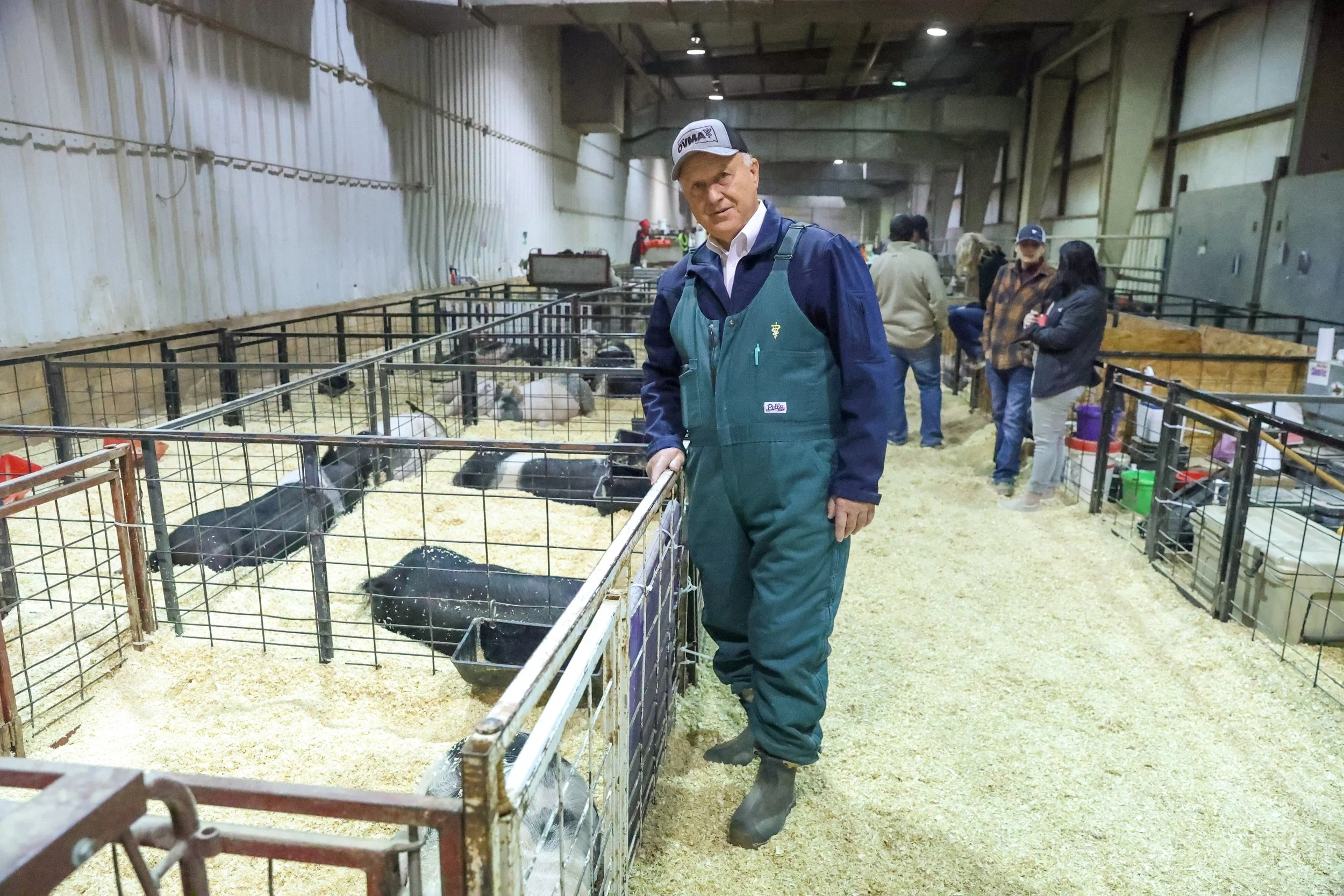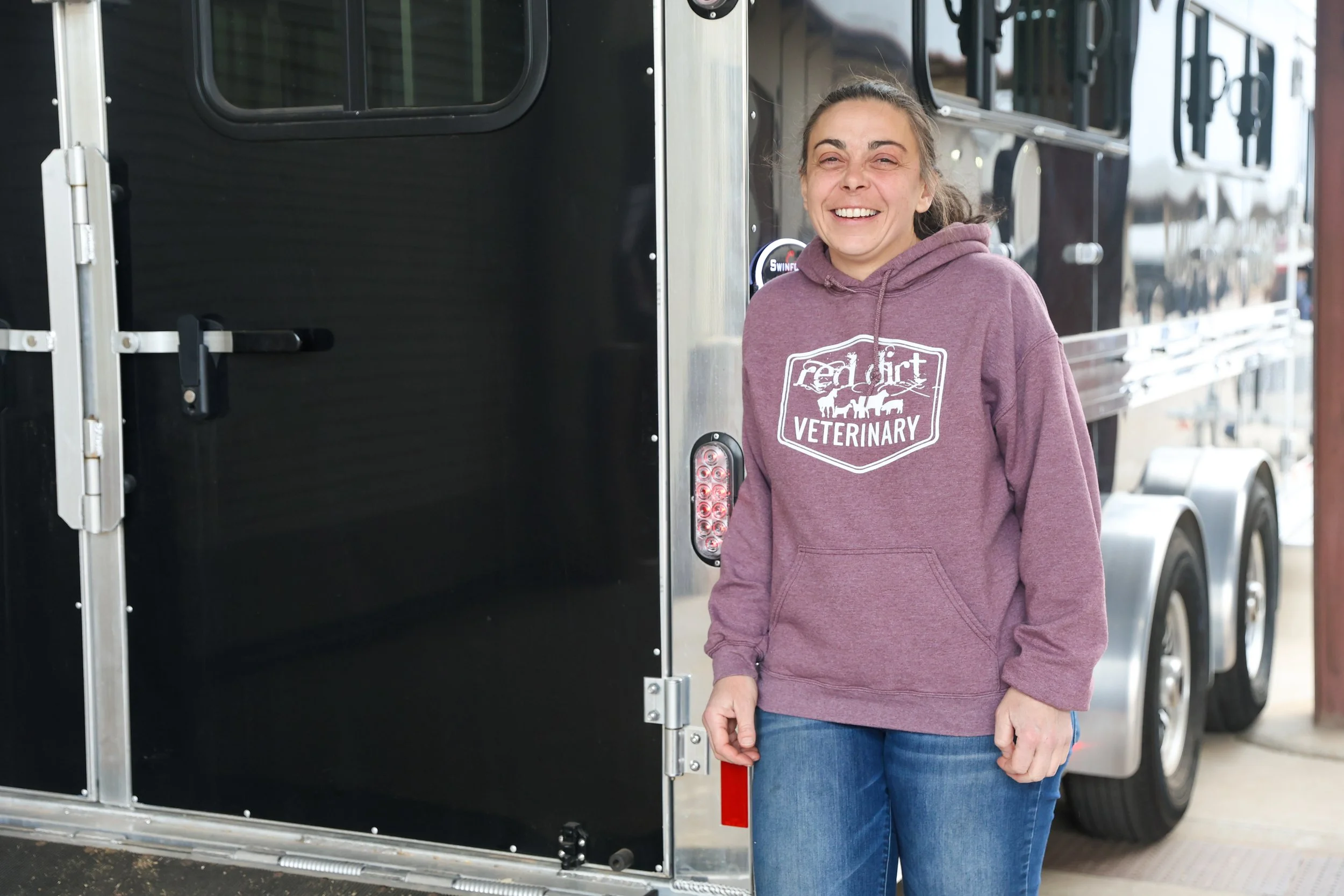Show Pig Biosecurity
Biosecurity is a critical step to keep your pigs healthy before, during and after a pit show
Did you know that regardless of how many pigs you care for, whether it’s a single show pig or thousands of market hogs, you are part of the pork industry? And, just as you are responsible for keeping your show pigs healthy, you share the responsibility of keeping all the pigs across Oklahoma healthy.
A healthy swine herd starts with raising healthy pigs at home, and raising a healthy pig starts with biosecurity.
What is biosecurity? Biosecurity means doing everything you can to reduce the chances of an infectious disease being carried by people, animals, equipment or vehicles.
Biosecurity is a combination of management practices designed to prevent the introduction and transmission of diseases and disease-causing agents into a herd. Procedures typically associated with a biosecurity plan include barn equipment and transport vehicle/trailer sanitation, rodent control, worker and visitor entry policies and general farm security measures.
Before the Show
Prior to attending a show, review your biosecurity plan to be prepared to protect your pig’s health. Many fairs and exhibitions require health papers that list specific vaccines given, such as influenza, and may require targeted health testing, such as for PRRS or PEDv. Make sure to bring a written record of all your pig’s treatments and vaccinations. As part of your biosecurity plan, work with your veterinarian to determine the appropriate vaccination schedule and testing needs for your pig.
At the show
Direct contact between pigs is the most common way diseases are spread. Following the principles of biosecurity and disease prevention to minimize unnecessary contact with unrelated swine or equipment during the exhibition.
returning home
The implementation of a biosecurity plan does not stop at the end of a show. Taking biosecurity precautions when you return home is just as important as those you take before and during the show.
Monday, March 13, 2023
PLEASE TAKE PRECAUTIONS REGARDING PEDv:
As you return to your normal activities during and after the Oklahoma Youth Expo, we would encourage you to continue to monitor the health of your show animals, especially your swine following the diagnosis of porcine epidemic diarrhea virus (PEDv) at this year’s show.
PEDv is a swine-only disease. It does not affect humans and the meat from animals that have had PEDv is safe to eat.
Do Your Part:
Sick animals should not show.
Should your animals exhibit any of the symptoms of PEDv, please contact your veterinarian.
Additionally, if you brought home animals from OYE, please continue to isolate those animals from any others you may have on your farm. Animals that have been ill with PEDv or suspected of having PEDv should continue to be isolated for at least two weeks after clinical signs of the disease have ended. Hogs can continue to shed the virus for weeks after they appear to be disease free. Clean and disinfect all equipment that went to OYE. That includes trailers, show equipment, clothing, shoes, and vehicles. It only takes a very small amount of PEDv to infect a large number of animals.
Please be respectful of your neighbors. If you live near a commercial swine facility, please reach out to your neighbors and let them know you have infected animals and that you are doing everything you can to limit spread of the disease. The impact of PEDv on a commercial sow farm is devastating – both emotionally and financially due to the loss of baby pigs.
If everyone who attended OYE approaches dealing with PEDv with the same conviction and commitment to winning that we approached showing our hogs, we can limit the spread of the disease. It will take a team effort, but it can be done.
If you have any questions about PEDv, please contact your veterinarian, the state veterinarian’s office at 405-522-0270, or the Oklahoma Pork Council at 405-232-3781.
“There is a tremendous amount of hard work and effort that goes into preparing hogs to compete at OYE. I appreciate the Swine Committee, OYE staff, Ag Teachers, 4-H Educators, parents, and friends who make this event possible for Oklahoma youth. As always, we want to highlight the importance of biosecurity and animal health for all those participating. Making good decisions and being responsible livestock owners is imperative for the continued success of livestock shows and the commercial industry.” - Oklahoma Secretary of Agriculture Blayne Arthur
Transportation Biosecurity Recommendations
Purchasers and exhibitors of swine at Oklahoma Youth Expo should assume that the swine have been exposed to Porcine Epidemic Diarrhea (PED). To protect herds of swine that show pigs are returning to or receiving OYE swine, please follow the recommendations below.
Remember that diseases like PED virus can survive in organic matter and be carried on contaminated boots, clothing, tires, undercarriages, trailers, shovels, and equipment. Before loading and transporting pigs, it is important to follow a few guidelines to minimize the risk of disease exposure to the farm and to minimize spreading the disease between loads. These steps will help protect your swine herd after attending any exhibition or sale. Ensure the truck and trailer have been thoroughly cleaned from the top to the bottom paying close attention to undercarriage, fenders, and tires.
Use an appropriate disinfectant, at the correct rate, for the proper contact time, and applied so that all surfaces are covered. Allow to dry.
Any equipment needs to be thoroughly cleaned, disinfected, and dried prior to being used.
Establish a line of separation (LOS) for loading pigs.
An effective LOS is the back of the trailer. This establishes a clean and dirty side so that animals and people that cross the line are done so in a manner to prevent disease introduction.
If using shavings at the trailer exit, be sure they are clean and kept far enough back so they don’t cross the LOS.
Pigs should be walked up to the LOS and then handed off to the Driver on the truck side (clean side) of the LOS.
Only the driver wearing dedicated clothing and footwear is allowed to enter the trailer on the truck side of the LOS to load pigs.
If the LOS needs to be crossed, disposable boots and coveralls should be used.
Boots and dedicated clothing are removed prior to entering the truck cab and placed in a tub to be cleaned and disinfected. Another set of clean boots and clothing should be made available to be worn inside the cab.
If possible before entering the farm entrance, clean and disinfect undercarriage, fenders, and tires.
Establish LOS for offloading pigs. Pigs should be isolated from the general herd and the truck and trailer should not cross or have direct contact with general herd and their normal routes of movement.
Pigs should be offloaded by the Driver (again wearing dedicated footwear and clothing) and be received by an individual who stays on the farm side (clean side) of the LOS. This individual does not cross the LOS to enter the trailer and then cross the LOS to get back to the farm side. At this point the truck and trailer should be considered dirty and every effort should be made to prevent cross contamination. Pigs should not be allowed to reenter the trailer.
Once the pigs are offloaded, the Driver removes dedicated clothing prior to entering the truck cab and promptly cleans and disinfects truck and trailer to be prepared for the next load.
“Exhibitors, you have as much at stake as any. You need to own this.”
Click here to download the ODAFF PEDv Fact Sheet.
Whether you have a single show pig or a sow herd of your own, you are part of the Oklahoma pork industry! And, just as you are responsible for keeping your show pigs healthy, you share the responsibility of keeping all the pigs across Oklahoma healthy. Do your part by practicing good biosecurity during and after the Oklahoma Youth Expo. If there is anything the Oklahoma Pork Council can do for you, please give me a call at 405-232-3781.
- Kylee Deniz, Oklahoma Pork Executive Director
Click here to download the complete Champions Guide to Biosecurity
“If you notice any health problems in your pigs, be sure to contact your veterinarian as soon as possible. Your veterinarian will work with you to develop a treatment schedule.”
“If you brought home animals from OYE, please continue to isolate those animals from any others you may have on your farm. Animals that have been ill with PEDv or suspected of having PEDv should continue to be isolated for at least two weeks after clinical signs of the disease have ended. Hogs can continue to shed the virus for weeks after they appear to be disease free. Clean and disinfect all equipment that went to OYE. That includes trailers, show equipment, clothing, shoes, and vehicles. It only takes a very small amount of PEDv to infect a large number of animals.”






